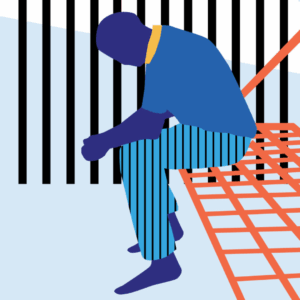Nardis Maynard
Almost 20 years ago, in July 2004, Nardis was convicted in St Kitts and Nevis for the murder of Ernest Henry. He was sentenced to life in prison, but always maintained his innocence, claiming that the prosecution was a case of mistaken identity. It took almost 20 years to bring his case to the highest court of appeal for St Kitts and Nevis and show that his conviction was a result of a litany of errors.
Identification Evidence
During the night of 22 March 2003 Ernest Henry was stabbed and killed in St Kitts and Nevis. Two days later Nardis Maynard was arrested. The offence was seen by bystanders, none of whom identified Nardis when giving their first account of the offence. The witnesses only gave a description identifying Nardis after he had been arrested.
No forensic evidence implicated Nardis and the entirety of the case against Nardis was based on witnesses positively identifying him.
From his arrest, through his trial and various appeals Nardis maintained that he was at home at the time of the offence with his sister and her boyfriend. At the time of the trial, he informed his lawyers that his family could corroborate this, however, no witness statements were taken from them.
At trial, no witnesses were called in Nardis’s defence, despite his instructions. Nevertheless, he gave evidence at trial, saying that he was at home with his family. Nardis was convicted on 22 July 2004 and sentenced to life in prison.
Appeal Abandoned
Nardis appealed against his conviction and sentence. In 2006, this came before the Court of Appeal. During the hearing of the appeal Nardis’s lawyers abandoned his application to appeal against his conviction without his consent. The Court of Appeal handed down judgment in May 2006, but the judgment was not sent to Nardis.
Almost eight years later, in March 2014, Nardis became aware of this judgment. He sought assistance to re-open his appeal, as he had not authorised his legal team to abandon it in the first place. He wrote to The Death Penalty Project to ask for help. It took 5 years to build a case from incomplete trial documents.
The Death Penalty Project worked with Talibah Byron, of Byron & Byron Attorneys in St Kitts and Nevis, and Siobhan Grey KC, a barrister in the United Kingdom. Working with this new legal we resolved to re-open Nardis’s appeal as we suspected there had been a miscarriage of justice. The team travelled to St Kitts and Nevis to speak to Nardis about his case.
We reached out to the trial lawyers to obtain information about their actions at trial and in the 2006 appeal. We asked, why the original appeal was abandoned and why no alibi witnesses had been called. We didn’t receive satisfactory answers to these questions. It later came to light that Nardis’s lead counsel did not speak to him at any stage during the proceedings. This concession was made only when a court directed Nardis’s trial counsel to file evidence.
Nardis’s case is re-opened
An appeal was filed in the Eastern Caribbean Supreme Court in June 2020. Nardis sought to re-open the appeal on the basis that it was abandoned without his consent. Nardis argued that there were witnesses at the time who would have corroborated his alibi. His sister gave a statement that supported Nardis’s defence of alibi and confirmed that she was never previously approached or asked to give a statement. Nardis’s brother was sadly unable to give a statement as he died in 2012.
The Court agreed to set aside the abandonment of Nardis’s appeal against conviction and the appeal against Nardis’s conviction was reopened. It was heard on 25 March 2022 and the Death Penalty Project’s team argued that the following features rendered Nardis’s conviction a miscarriage of justice:
- The failure to call Nardis’s alibi witnesses at the original trial for murder.
- The judge’s failure to identify obvious weaknesses and inconsistencies in the evidence regarding the identification of Nardis in the initial witness evidence to the jury.
- The failure to tell the jury that Nardis had not previously been convicted of an offence.
When the court dismissed Nardis’s appeal, we brought a further appeal to the Privy Council in 2022. The Privy Council granted permission to appeal in 2023 on all the grounds which we advanced. There had been material and serious errors in Nardis’s case, both by his former legal representatives and the trial court. We argued that this litany of errors in Nardis’s case had led to a trial which was unfair.
His lawyers at trial had taken no steps to prove his defence of alibi. The court had ignored the internal inconsistencies in the witnesses’ evidence. The witnesses did not identify Nardis when giving statement to the police and his name was only referred to by witnesses once he had been arrested.
Nardis’s case was heard on 6 June 2024 by the Privy Council. In their judgment of 1 August 2024, the Board found that it would be unjust for Nardis’s conviction to stand. The Privy Council expressed particular concern that the trial judge had failed to fairly and accurately describe the weaknesses in the prosecution’s case to the jury.
The Privy Council subsequently directed the Eastern Caribbean Supreme Court to determine whether Nardis should go through a retrial. The legal team made representations to The Director of Public Prosecutions in St Kitts and Nevis, arguing that it was impossible for Nardis to have a fair trial. The length of time Nardis has served, the weaknesses in the prosecution’s case, the death of some of the witnesses and the failings by his lawyers were powerful reasons to not seek a retrial. The Director of Public Prosecutions agreed that it would not be in the public interest for Nardis to go through another criminal trial.
At a hearing before Justice Price-Findlay on 4 November 2024, the Director of Public Prosecutions agreed to formally discontinue the case against Nardis. Commenting on the time the case had taken to reach a final conclusion, the judge said “I hope that in the time I have left on the bench we don’t see something like this again. The time that Mr Maynard has lost cannot be given back to him.” Shortly after the hearing, Nardis was released after over 20 years in prison and was finally reunited with his family.

Case Timeline
-
Murder of Ernest Henry
-
Nardis is arrested
-
Criminal Appeal: Nardis’s lawyer writes to the prosecution indicating that the team intended to call his sister (Yvette Maynard) and brother (Terence Maynard) as alibi witnesses.
-
The Director of Public Prosecutions writes to Nardis’s lawyers to seek the statements of the proposed witnesses. The statements are not produced for trial.
-
Nardis stands trial on a single charge of murder. During the trial, Nardis says he was at home with Yvette and Terence at the time of the murder. Neither are called by his lawyers to give evidence.
-
Nardis is convicted of murder.
-
Nardis is sentenced to life in prison.
-
Court of Appeal (1st Attempt): Nardis initiates an appeal against his conviction and sentence.
-
During the hearing of Nardis’s appeal his lawyers abandons the appeal against conviction. Before doing so he did not speak to Nardis and did not get his consent.
-
The Court of Appeal dismisses Nardis’s appeal against sentence and notes that the appeal against conviction had been abandoned. This decision was not sent to Nardis.
-
Nardis writes to the Registrar of the Eastern Caribbean Supreme Court of Appeal asking for an update on his appeal. He says that he had never had the judgment of the Court of Appeal communicated him.
-
Court of Appeal (2nd Attempt): Nardis writes to The Death Penalty Project asking for assistance.
-
The Death Penalty Project try to gather evidence from Nardis’s case. We reach out to the trial lawyers. A decision is made to re-open the Court of Appeal proceedings of 2006, on the basis that the appeal against conviction was withdrawn without the Nardis’s knowledge.
-
Having been contacted by Nardis’s new legal team, Yvette swears an affidavit saying that she was not approached to be a witness in the 2004 trial. She tried to attend the trial but was stopped, by the police, from going into the courtroom.
-
Appellant files an application in the Eastern Caribbean Supreme Court of Appeal seeking a declaration that the withdrawal of his appeal against conviction was a nullity, on the basis that the appeal was abandoned without instructions. Nardis seeks to overturn his conviction on the basis that witnesses had not been called and the judge misdirected the jury on the identification evidence.
-
At the direction of the court, Nardis’s trial lawyer files an affidavit saying that he had never met or interacted with Nardis.
-
At the second appeal hearing the court finds that the initial abandonment Nardis’s appeal was a nullity and re-opens the appeal against conviction.
-
The court dismisses Nardis’s appeal.
-
Nardis files a notice of appeal with the Judicial Committee of the Privy Council.
-
The Privy Council grants permission to appeal.
-
Following drafting our written arguments, The Death Penalty Project writes to the solicitors for the prosecution inviting them to concede the appeal, given the totality of the mistakes in Nardis’s case.
-
The Privy Council hears Nardis’s appeal against his conviction.
-
The Privy Council allow Nardis’s appeal against conviction.
-
The Eastern Caribbean Supreme Court orders the Director of Public Prosecutions to discontinue the case against Nardis.
-
Nardis is released from prison.
















